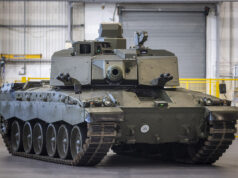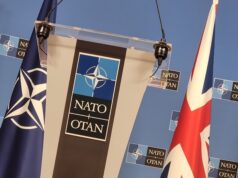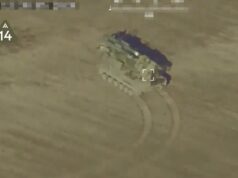Hysteria that the Ajax Fighting Vehicle fleet will be Spanish built is misleading as the majority of the work is being carried out by British firms.
As the programme stands today, 100 of the new vehicles will be fully manufactured and assembled in Spain. The hulls of the other 489 will be shipped to Merthyr Tydfil in Wales for completion.
A Ministry of Defence spokesperson highlighted UK wide involvement in the programme:
“The UK government is determined to see as many MOD projects designed, built and manufactured here in the UK. The AJAX programme alone is sustaining 2,800 jobs across the country at more than 210 companies across the UK supply chain.
The manufacturing and Assembly, Integration and Testing (AIT) processes for AJAX have been agreed with GDUK, the prime contractor, to ensure that the British Army receives the capability it deserves.An extensive UK supply chain is involved in the AIT activity at Merthyr Tydfil, including Lockheed Martin UK who are delivering a world-leading turret for the Ajax variant, providing significant improvements in combat capability, survivability and operational effectiveness for British soldiers, and Thales, based in Glasgow, who will be providing the Primary and Secondary Sights for AJAX.”
With regards to the steel, the government said:
“The steel sourced for AJAX so far is a form of specialist steel, which UK manufacturers were not able to provide. However, there remains a competition to be completed for the fabrication of modular armour for AJAX, which UK manufacturers will have every opportunity to bid for.”
In addition, Cook Defence Systems has won a £30m contract to supply parts for a new fleet of British Army fighting vehicles. The firm is part of the Sheffield-based William Cook Group and will supply the track system for Ajax.
The programme will sustain nearly 1,300 jobs across the UK and while it is regrettable that it will not be 100% UK built, it should be noted that 100% indigenous platforms are virtually non-existent around the world and doing it this way gets us these sorely needed vehicles quicker and cheaper.













Jamie Lees
Majority still in Spain brother Nicholls
Plenty of work still done in wales, and they should be thankful. What do the Welsh no about anything but sheep shagging and coal digging
You’re right there. You gonna go down and show them how it’s done ? Wonder how many birds they employ down there ??
Well Bert will get a job down there making tank construction more sexy
???? worst comment I’ve ever heard anycunt in the yard say
Aye apart from every other comment he makes
True biggest bullshitter about ???
Considering the press coverage the AIT facility got when it opened its a surprise there is so much “hysteria” about the Spanish involvement.
Poor journalism springs to mind once again.
well said
Please feel free to forward any suggestions regarding our content and how we can improve to us by messaging the page!
I’m not suggesting poor journalism on your part, but the journalists who have stirred up the hysteria.
so the Spanish threaten Gibraltar and Britain award them a defence contract Hmmm… ok
Good vehicles but from speaking with a few friends at Bovington they preferred the CV90 which had better performance and handling..came down to cost as always.
The CV90 has better performance than the Spanish and Austrian variants (600bhp and 720bhp, respectively…if memory serves). The Ajax has an 805bhp engine.
What the hell?!! Spain!!
After all the crap they’re stirring up at Gibraltar!
Disgusting that any of it is being made there!
this country is just an assembly plant now.everything seems to be built abroad and shipped here in boxes to be put together..
How is “putting together” not building?! Semantics just to stir up fake outrage…
Déjà vu all over again…
Absolutely nothing wrong with that plan.
Why are 100 vehicles being built in Spain and the rest assembled in the UK? Surely if it’s that good a deal then all assembled in Spain, or all in UK. I must be missing something
Gone are the days when they would have all been built in this country, sounds more like we are trying to appease our EU friends
The Spanish are just shipping empty shells. Nearly all the technical work will be supplier and manufactured in the UK. Same as Bentleys where the shells are built in Bavaria and then shipped to UK for assembly. Media have not mentioned the huge amount of UK defence systems that are integrated into other defence platforms abroad.
Graham Nicholls, you are a complete and utter arsehole.
Why have these Ajax fighting vehicles not been fitted for Tow missiles like the Usa Bradley fighting vehicles
Another sop to the EU.
Why don’t the remain lot just admit they’re EU federalists and want to see the UK replaced by the 1st United Republic of Europe.
Another example of the government failing to support the manufacturing base. Royal Fleet tankers being built in Korea with more orders to go there. Over 8,000 MAN and Oshkosh lorries purchased from the USA and Germany. Aircraft, UAV, helicopter and missile capability increasingly being relegated to assembling foreign built parts. Cost savings buying abroad is insignificant compared to economics of supporting skilled manufacturing jobs in the UK. It is now almost inevitable that the majority of next generation of low and high tech military equipment will have to be bought from Europe, Asia and the USA. A recent report into the cost of closing down the coal mining industry over 20 years, found it would have been cheaper to keep the pits open than the cost to the welfare budget and unsustainable job creation schemes, many of which are now shut. It makes no economic sense to hemorrhage billons of £’s out of the UK economy and fail to support UK employment and capabilities in order to meet the obligations of national defence.